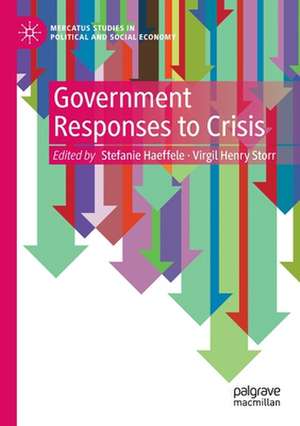Government Responses to Crisis: Mercatus Studies in Political and Social Economy
Editat de Stefanie Haeffele, Virgil Henry Storren Limba Engleză Paperback – 26 mar 2020
Preț: 201.67 lei
Nou
Puncte Express: 303
Preț estimativ în valută:
38.59€ • 40.05$ • 32.26£
38.59€ • 40.05$ • 32.26£
Carte disponibilă
Livrare economică 24 februarie-10 martie
Livrare express 08-14 februarie pentru 36.22 lei
Preluare comenzi: 021 569.72.76
Specificații
ISBN-13: 9783030393083
ISBN-10: 3030393089
Pagini: 145
Ilustrații: IX, 145 p.
Dimensiuni: 148 x 210 x 11 mm
Greutate: 0.2 kg
Ediția:1st ed. 2020
Editura: Springer International Publishing
Colecția Palgrave Macmillan
Seria Mercatus Studies in Political and Social Economy
Locul publicării:Cham, Switzerland
ISBN-10: 3030393089
Pagini: 145
Ilustrații: IX, 145 p.
Dimensiuni: 148 x 210 x 11 mm
Greutate: 0.2 kg
Ediția:1st ed. 2020
Editura: Springer International Publishing
Colecția Palgrave Macmillan
Seria Mercatus Studies in Political and Social Economy
Locul publicării:Cham, Switzerland
Cuprins
1. Introduction.- 2. The Rules of the Game and Post-disaster Rebuilding and Recovery.- 3. Government as Gardener: Cultivating the Environment for Private Sector Natural Disaster Response.- 4. The Role of the Local Emergency Manager in a Centralized System of Disaster Management.- 5. Recognizing Vulnerability and Capacity: Federal Initiatives Focused on Children and Youth across the Disaster Lifecycle.- 6. The Political Economy of Foreign Intervention.- 7. When is Top-down State-building Appropriate?.- 8. The European Migrant Crisis: A Case Study in Failure of Government and Supra-governmental Responses.
Notă biografică
Stefanie Haeffele is Deputy Director, Academic and Student Programs and senior fellow, F. A. Hayek Program for Advanced Study in Philosophy, Politics, and Economics at the Mercatus Center at George Mason University, USA. She earned her M.A. and Ph.D. in economics at George Mason University and her B.B.A. from the University of North Alabama, and previously worked in emergency and disaster management at both the Federal Emergency Management Agency and then the US Forest Service as a Presidential Management Fellow.
Virgil Henry Storr is Vice President, Academic and Student Programs, and Don C. Lavoie Research Fellow, F. A. Hayek Program for Advanced Study in Philosophy, Politics, and Economics at the Mercatus Center at George Mason University, USA. He also is Associate Professor of Economics at George Mason University. Dr. Storr received his Ph.D. in economics from George Mason University and his B.A. from Beloit College.
Virgil Henry Storr is Vice President, Academic and Student Programs, and Don C. Lavoie Research Fellow, F. A. Hayek Program for Advanced Study in Philosophy, Politics, and Economics at the Mercatus Center at George Mason University, USA. He also is Associate Professor of Economics at George Mason University. Dr. Storr received his Ph.D. in economics from George Mason University and his B.A. from Beloit College.
Textul de pe ultima copertă
When crises occur, citizens, media and policymakers alike expect government to respond and to take a leading role in recovery. Given the scale and scope of crises, whether natural (such as hurricanes, floods, and earthquakes), manmade (such as conflict and economic downturns), or often a combination of the two, governments are often seen as being in the best position to identify the problems, understand the circumstances, and direct action. They are also likely to be the entities that have adequate resources to devote to such large-scale efforts. Yet, governments are not spared from the effects of crises. They are composed of individuals who are impacted by disasters and face many of the same challenges in identifying needs, prioritizing action, and adjusting to changing circumstances. It is by no surprise that governments are also often scrutinized during and after crises. How, then, do we understand the capability of and proper role for governments to respond to crisis and to drive recovery?This edited volume—comprised of chapters by accomplished scholars and seasoned practitioners in disaster and crises studies and management, spanning multiple disciplines including sociology, economics, and public administration—examines the roles, expectations, and capabilities of government responses to crises. It gives an overview of the literature, provides lessons learned from both research and experience on the ground during crises, and puts forth a framework for understanding crisis management and subsequent policy implications. It will be of use to any scholars, students, practitioners or policymakers interested in learning from and better preparing for crises and responding when they do occur.
Caracteristici
Takes a critical look at how the government can be effective and ineffective in responding to crises Combines a scholarly approach with experiential knowledge to provide scholars, practitioners, and policymakers a comprehensive approach to disaster recovery Includes contributions from experts across a variety of disciplines, including economics, political science, and sociology, to allow a wider perspective on disaster recovery




